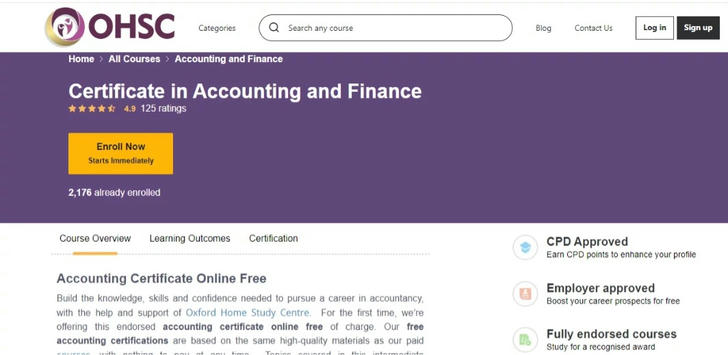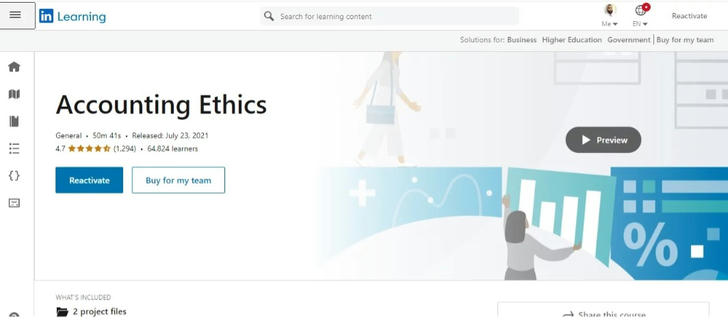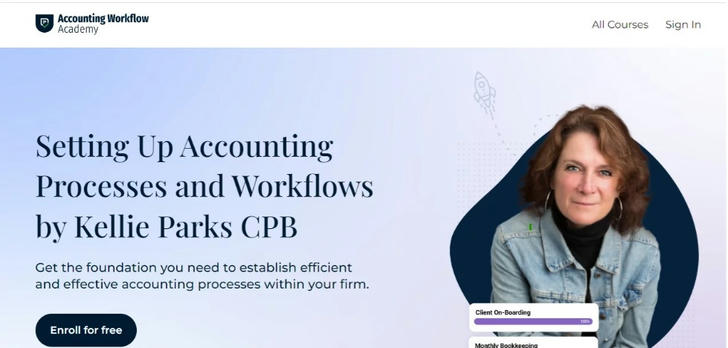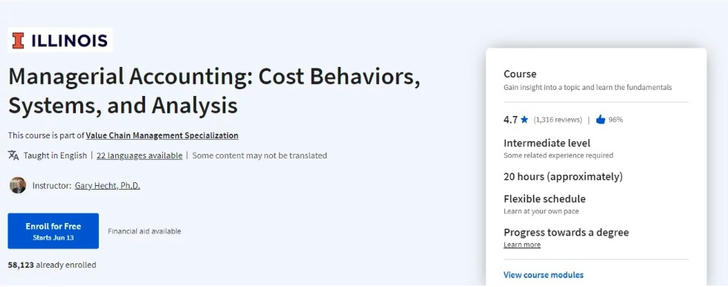4 Best Free Online Accounting Courses with Certificates
The 4 Best Free Accounting Courses Online with Certificate
Certificate in Accounting and Finance

The Certificate in Accounting and Finance course is an intermediate course offered by the Oxford Home Study Centre.
Created from the same quality of materials as their paid courses, this free course helps accounting professionals build the knowledge, skills, and confidence they need to improve their quality of work and or run their accounting firms.
Why You Should Take It
This course breaks down important accounting concepts (like profit and loss statements), establishes the role of working capital in business operations, and showcases how you can use cash flow statements for business analysis.
Course Curriculum
Its topics include:
Introduction to Accounting
Subsidiary books of accounting
How to create a profit and loss account
How to prepare a cash flow statement
How to prepare a balance sheet
Duration 200 hours
Instructor All OHSC accounting courses are taught by accounting experts.
Certificate – Paid This course allows you to claim one of the following certificates (costs range between $10 and $120).
Course Completion Certificate from the Oxford Home Study Centre
A CPD Accredited Certificate
An Endorsed Certificate by the Quality License Scheme
Accounting Ethics

Ajay Pangatka’s Accounting Ethics course seeks to help accounting professionals and financial controllers address the challenges of communicating their client’s financial health. The course explains ethics in accounting and corporate culture while establishing the importance of professional accountability and internal control in maintaining public trust.
The course is free with a LinkedIn Learning or LinkedIn Premium subscription.
Why You Should Take It
Regulatory compliance (which ensures accurate financial reporting) is vital to the integrity of the accounting profession. This course empowers the accounting professional to leverage internal controls for reliable financial information.
Course Curriculum
The course modules include:
Values, Ethics, and Governance: defines ethics, objectivity, transparency, and accountability within the accounting profession.
Ethical Responsibility for Business: establishes the differences between legal and ethical choices and explains ethics as a code of conduct for accountants.
Accounting Ethical Responsibilities: explains ethical consideration and code of conduct in accounting and internal controls and audit.
Duration 50 Minutes,Instructor Ajay M. Pangarkar, CTDP, FCPA, FCMA,Co-founder of CentralKnowledge,Certificate – Free Free certificate upon completion
Setting Up Accounting Processes and Workflows

Unlike most courses in this list, this course moves away from core accounting knowledge to the systems that enable accounting professionals to get work done.
As one of the courses in Financial Cents’ Accounting Workflow Academy, Setting Up Accounting Processes and Workflow equips you with the tools you need to manage your client’s work efficiently.
The course is self-paced, and its insights are easy to implement, allowing you to learn and apply its lessons in stages.
Why You Should Take It
The instructor, Kellie Parks, teaches accounting professionals to build systems that unlock efficiency, consistency, and accountability in their firms. Her community, The Workflow WateringHole, is home to 5000+ accountants, bookkeepers, and CPAs finding new ways to boost productivity and increase revenue.
This course also gives you access to Financial Cents’ community of accounting firm owners with whom you can learn and grow your firms.
Managerial Accounting: Cost Behaviors, Systems, and Analysis

This course teaches accountants how to create and communicate financial information in line with corporate decision-making. It shows accountants how to help their clients make the best of what-if situations using tools like cost-volume-profit (CVP) analysis.
This course allows you to progress onto a degree program at the University of Illinois at Urbana-Champaign.
Why You Should Take It
Understanding activity-based costing (one of the topics in this course) will empower you to help your clients make the best purchase decisions to grow their businesses.
Course Curriculum
The course modules include:
Introduction to Managerial Accounting: explains fundamental costing concepts.
Costing Systems I – Elements and Design: focuses on the best ways to use costing systems and the role of overhead cost in cost information.
Costing Systems II – Activity-Based Costing: gives examples of activity-based costing and its advantages and disadvantages.
Cost-Volume-Profit (CVP) Analysis: explains how managers can use CVP to proffer solutions to what-if problems.
